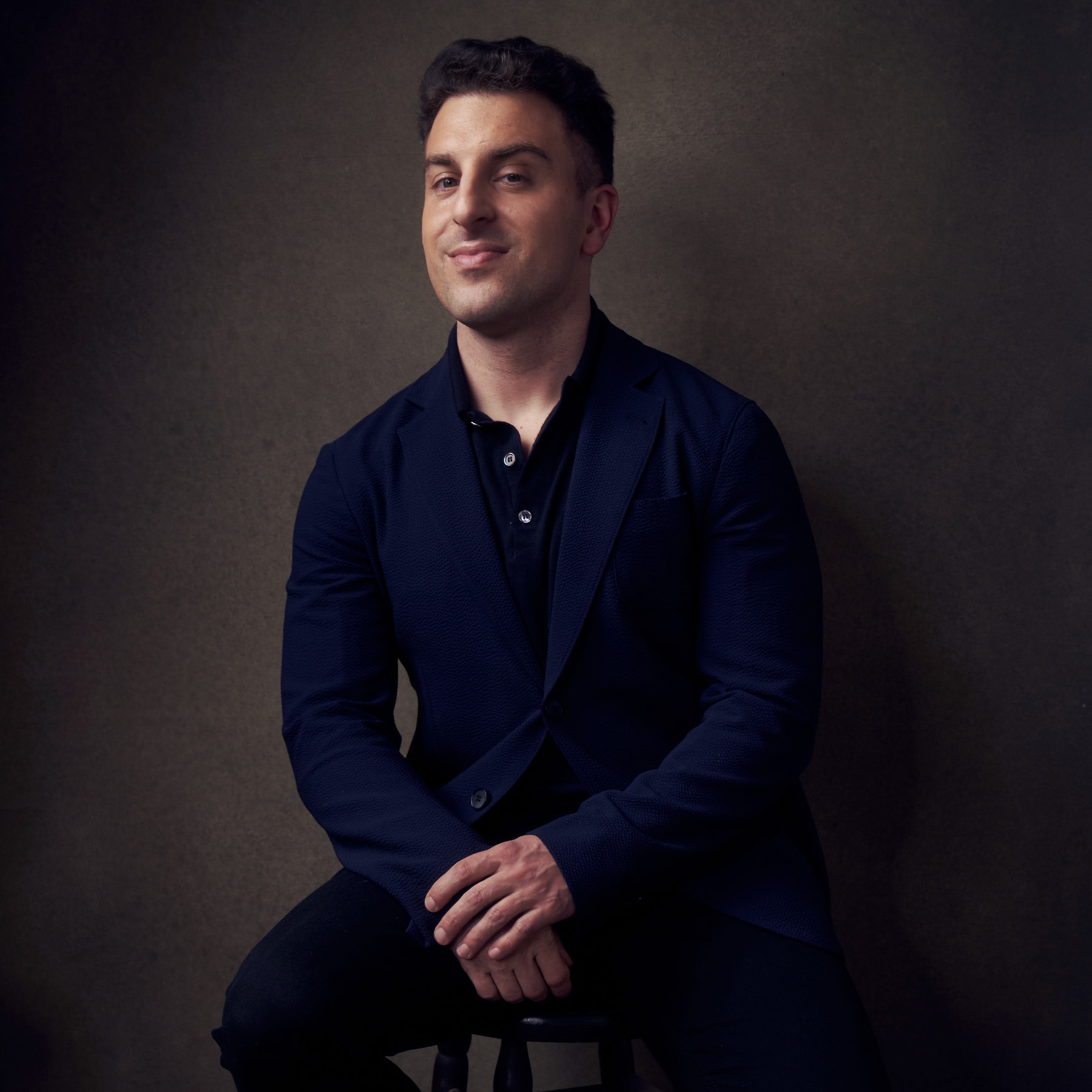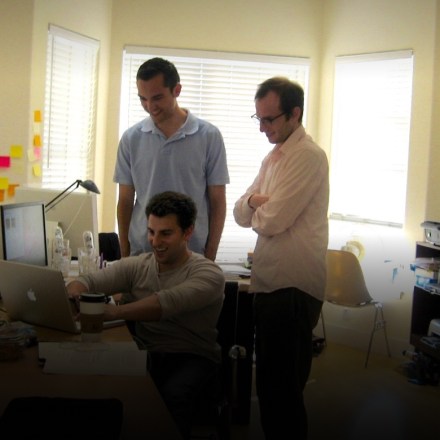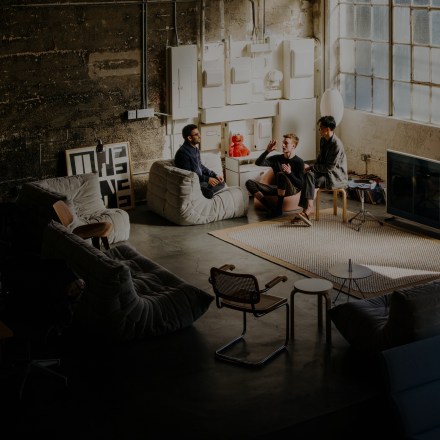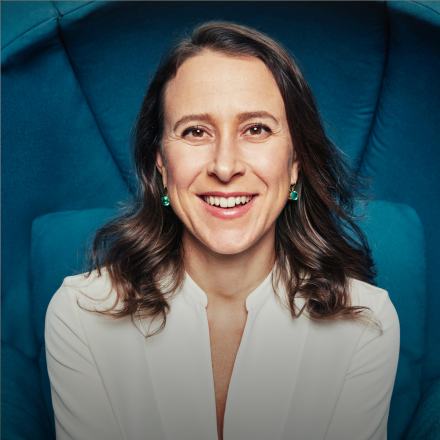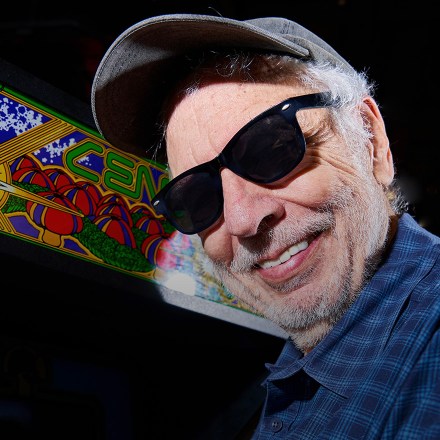It is morning in late 2021, and Brian Chesky is sitting at home in San Francisco, wearing a loose blue T-shirt and black browline glasses. In the background of his Zoom frame, his golden retriever lazily ambles around the minimalist, art-and-book-adorned room that calls to mind some of the chicest Super Host spaces on the site Chesky co-founded and still runs. Chesky, 40, has been asked to fit the pieces of his current life—the one in which he sits atop Airbnb, a $100 billion company that is arguably the greatest disrupter in contemporary global tourism—with those of his humble, and apparently untouristy, beginnings.
Chesky grew up in Niskayuna, a leafy upstate New York suburb wedged between Schenectady and the Mohawk River. His parents, Deborah and Robert, were both social workers, and much of their time was consumed with finding shelter and care for the community’s neediest people. Chesky’s childhood was not lavish; adventures were mostly limited to away ice hockey games and afternoons at Albany’s Crossgates Mall, which he remembers as “a little sequestered world that you could be in, run around in,” and was “never-ending entertainment.”
Once a year, however, Deborah and Robert were able to take Brian and his younger sister Allison on an airplane, to an annual conference that Deborah was required to attend. “The hotel and flight were paid for,” Chesky remembers, “so we basically turned the conference into a family vacation.”
When Chesky was seven, Deborah’s conference was in St. Louis. Already beginning to show interest in art and design—“I’d ask Santa Claus for poorly designed toys so I could redesign them”—Chesky explored the city with his family, reimagining the layout of its buildings, its streets, its sprawl. No space was spared the cocktail of creativity and structure that was Brian’s mind. That family trip, along with future ones to other cities, is one of his “greatest memories of growing up.”
Startup founders often build their companies around a lifelong passion, be it for food, personal computers or for shape-fitting athleisure wear. Airbnb, however, was not born from its founders’ experiences with gallivanting around the globe. Chesky didn’t gallivant. He barely understood that gallivanting was a thing.
“Travel was not a passion,” Chesky says. “Co-founding Airbnb was my discovery of travel—it was the moment I realized there was a bigger world.”
Get the best stories from the Sequoia community.
“There’s this whole way of traveling—I call it mass tourism—where you just stay in a hotel district and do things that the people who live there would never do. There’s no real connection, and you leave the city not really having any impression of what it’s like to live there.”
BRIAN CHESKY
Chesky’s early mental exercises of redesigning urban spaces sat dormant until 2007, when he and his roommate Joe Gebbia found themselves struggling to pay rent. The two friends decided to inflate three air mattresses in their San Francisco apartment, located on Rausch Street in the city’s SoMa neighborhood, and rent them out for $80 a night. They called the service Air Bed and Breakfast.
One of their first guests was Amol Surve, who had come to the city for an industrial design conference. Unable to afford a hotel room, Surve found a post about Air Bed and Breakfast on a design blog. When he arrived at Chesky and Gebbia’s place, he found the two young entrepreneurs working on a pitch for their new hospitality venture. They asked Surve to jump in on the brainstorm; that night, he joined them at an event where they pitched the concept. Later that weekend, they took Surve to the Ferry Building for his first farmers’ market and to a hole-in-the-wall restaurant in the Mission for Mexican food. On Surve’s last day, Chesky drove him to Stanford so Surve could catch a lecture at the university’s design school. “It’s amazing how one trip can have such an impact on your life,” Surve later wrote on his blog.
For Chesky and Gebbia, the experience was equally transformative. “There’s this whole way of traveling—I call it mass tourism—where you just stay in a hotel district and do things that the people who live there would never do,” Chesky says now, reflecting back on that first experiment with hosting. “There’s no real connection, and you leave the city not really having any impression of what it’s like to live there.”
By 2008, Chesky and Gebbia, then 27, had a strong vision for their new company’s cultural touchstones and aesthetic, but they needed someone to transform those elements into a functional product. So, they brought in their friend Nathan Blecharczyk, then in his early 20s and a recent Harvard computer science graduate. That year, the trio officially launched AirBed&Breakfast. For their slogan, they settled on, “Book rooms with locals, rather than hotels.” Chesky might not have been able to literally redesign San Francisco for his guests, but with Gebbia and Blecharczyk’s help, perhaps he could redesign the way people experienced it.
Chesky’s passion for experiential tinkering had its first real-world tryout at the Rhode Island School of Design, where he studied industrial design. He met Gebbia at RISD, when Chesky signed up to run the ice hockey club and Gebbia the basketball club. Chesky credits overseeing the school’s ice hockey fan base—or lack thereof—as his first taste of what it feels like to run a company. “Joe and I had the hardest marketing challenge in the world,” he says. “How do you get art students to go to sports games?”
Chesky and Gebbia were accepted into RISD’s student-internship program, which placed them at Conair, the health and beauty appliances company. Their task was to design a new hairdryer, but they got carried away. Disregarding their assignment completely, the pair came up with a “soap shirt” that “you’d put on and wash off,” as Chesky puts it. “We ended up trying to redesign the corporate strategy, the company, which of course was completely unwanted by executives,” Chesky laughs. “The only feedback they gave me was to stop drinking coffee.”
Undeterred, Chesky landed a job post-college at a small Los Angeles design firm called 3DID. The firm’s founder, Matt Lazich, remembers Chesky as being a talented sketcher and CAD designer, and always “gung-ho when I gave him projects to work on.” This was L.A. in 2006—the golden age of reality talent shows. Riding his American Idol fame, host Simon Cowell had launched a new series called American Inventor. One of the finalists was a magician-turned-inventor who had come up with an airtight, ultra-hygienic toilet seat called the Pureflush. The show paired each finalist with a design firm that would help them build and test their product—and Chesky was saddled with Pureflush. “I was the guy on national television who had to redesign a toilet seat,” says Chesky.
The Pureflush lost the competition and ultimately tanked in the marketplace, but the experience realigned Chesky’s ambitions. “I was making all these products for these designers, and I kept thinking to myself, ‘What’s the difference between them and me?’” he says. “The difference was they were entrepreneurs—they had an idea, and they took a chance. I had many ideas; I just needed to take a chance.”
Around that time, he came home from work to find a letter from Gebbia, whom he hadn’t seen since their hair-drying days at Conair. Gebbia said that he’d moved to San Francisco and started a company that sold seat cushions for artists. He was ready to create something else. Would Chesky be interested in quitting his job, moving to the city, and splitting an apartment? “Let’s start a company together,” Gebbia said. Lazich remembers Chesky giving him his two weeks’ notice and mentioning he was off to San Francisco to design fiberglass furniture. “Brian was a talented designer,” Lazich says. “But nobody at the time could have said, ‘Oh, well, he’s going to do big things.’”

“I was a designer and art student; I was not very operational. What I loved about Alfred [Lin] was he was my opposite: incredibly analytical, but also someone who appreciated culture and would be willing to work with founders who had really strong visions.”
BRIAN CHESKY
When Chesky, Gebbia and Blecharczyk launched AirBed&Breakfast in 2008, they weren’t aware of any other Silicon Valley startup that had developed a peer-to-peer model that could toggle between the online and offline worlds—from managing user experiences to having to comply with local rules and regulations in different countries—and lived to tell the tale. (Uber would soon follow.) When a friend of the trio, Michael Seibel, co-founder of the company that would go on to become Twitch, helped them initiate their first hunt for investors, things didn’t go well. Out of seven potential investors, two never replied, and the other five sent rejection emails. One wrote that “the potential market opportunity did not seem large enough for our required model.”
Soon after, the co-founders applied for a spot in the startup accelerator Y Combinator, and were accepted. Sequoia Capital expressed interest even before the program’s Demo Day in 2009. Sequoia led a $600,000 seed round in their company—now rebranded Airbnb—shortly thereafter. Around that time, Chesky, Gebbia and Blecharczyk were invited to take a tour of Zappos, the online shoe store, where Alfred Lin was then COO. Lin was integral in building Zappos’ company culture, something that Chesky says he was “obsessed with at the time.”
When Lin left Zappos in 2010 and later joined Sequoia, Chesky asked him to join Airbnb’s board. “I was a designer and art student; I was not very operational,” says Chesky. “What I loved about Alfred was he was my opposite: incredibly analytical, but also someone who appreciated culture and would be willing to work with founders who had really strong visions.”
In 2011, the strength of Airbnb’s nascent culture would be tested. By that summer, several Airbnb imitators had surfaced—the most aggressive being Rocket Internet, a Germany-based company whose business model was built on cloning existing internet companies and undercutting enough of their market share to force an acquisition. To copy Airbnb and stunt its growth in Europe, which was just beginning to surge, Rocket Internet created the home booking and hosting company Wimdu. At that point, Lin says, Airbnb’s survival depended on leading the global homestay space, especially the European market. “We had to figure out how to commence a ground war, to win all the hosts in Europe,” he says.
Lin leveraged what he learned at Zappos, when it was also swarmed by competition, to assist Chesky in streamlining the Airbnb experience, from operational efficiency (smooth user experience for hosts and guests), to creating an aesthetic that stood out (pro-grade photos of hosts’ homes). They opened local offices and put a premium on customer service. Ease of booking and attention to guest feedback, coupled with a unified, chic host aesthetic, quickly drew travelers back to Airbnb. If young founders, most of whom have never managed people or built companies, are the boat, Chesky says, “investors are the current—they can steer you in the right direction or the wrong direction.” In the end, Wimdu folded and Airbnb won the “ground war.”
The existential challenges of those early years aided Airbnb’s ability to endure both competitive and regulatory headwinds, but they provided little comfort in March 2020, when COVID-19 descended on the world and changed the landscape of global travel. At the start of that year, Airbnb was cruising toward a planned IPO with a valuation hovering around $30 billion. “I’m sure [Chesky] had thought that he would have an easy 2020,” says Lin. “Because he would raise all this money in our IPO, and the travel industry was booming.”
In the span of eight weeks, Airbnb saw revenues plummet more than 80 percent. In a single day—“probably the most difficult of my life,” he told Masters of Scale—Chesky had to lay off nearly 1,900 employees, or almost 25 percent of the company. Headlines everywhere trumpeted the downfall of the travel industry’s once-great conqueror. “He went from the heights of Everest,” Lin says, “to standing over a cliff and staring down the abyss.”
After a lengthy board meeting that month, Chesky got a call from board member Ken Chenault, who had steered American Express from 2001 to 2018, through 9/11 and the Great Recession. Rather than deflated, Chenault was bullish. He encouraged Chesky to be the same: “This is your defining moment,” he said on the same episode of Masters of Scale.
Chenault’s call to arms spurred Chesky to stop and think about how he’d gotten here, about how—and, more important, why—he, Gebbia and Blecharczyk’s peer-to-peer, online-to-offline leap of faith had been so successful. In Airbnb’s 13 years of operation, they had built a network of more than 4 million hosts, who have welcomed more than 1 billion guest arrivals across 220 countries and regions. Despite its staggering size, Airbnb’s ethos has not only remained the same as it was when Chesky and Gebbia showed Amol Surve a new side of San Francisco in 2007—it has also adhered to Chesky’s childhood joy of reimagining cities, unlocking the often unseen adventures and experiences awaiting within.
Opening up their Rausch Street apartment to Surve had also been about lending a hand, a spirit that the cofounders cemented in Airbnb culture when, in the wake of Superstorm Sandy in 2012, they took up one of their host’s offers to provide housing for people whose homes had been destroyed by the storm. That decision led to the Open Homes initiative—now Airbnb.org—which has since housed more than 75,000 people affected by disasters, from the Nepal earthquake to the Syrian civil war, the Pulse Nightclub shooting to the fall of Kabul. “Brian is driven by the mission of wanting people to belong anywhere,” says Lin.
By the time the pandemic had locked down the world, Airbnb had about $1 billion in bookings that it decided to refund to guests. The company created a $250 million Host Fund to help hosts weather the ensuing months of lost income, and hosts from around the country sent nearly 100,000 letters to encourage the U.S. Congress and Senate to include them in the CARES Act. There was no financial model that justified doing this, Chesky later told an interviewer. It just seemed right.
“Brian went from the heights of Everest to standing over a cliff and staring down the abyss.”
ALFRED LIN
By late summer of 2020, the company’s original S-1—the initial Securities and Exchange Commission form required for a company to file to go public—no longer seemed relevant, so Chesky sat down and rewrote an entirely new S-1 that stretched to 14,000 words. He wagered that now, more than ever, the ethos of connection and belonging that defined Airbnb were the elements of the human condition that the world wanted most. He underscored his and Gebbia’s own experience as hosts renting out air beds in their San Francisco apartment. “Our guests arrived as strangers,” Chesky wrote in the founders’ letter accompanying the new S-1, “but they left as our friends.”
Chesky’s instincts couldn’t have been more correct. When the world began to reopen its doors in 2021, travelers flooded through, and Airbnb’s hosts were able to begin reopening their homes, too. In December 2020, the company went public with an expected valuation of $47 billion, and by day’s end its market cap had soared to $86.5 billion. Less than a year later, it’s worth over $100 billion. In the span of 10 months, Chesky had fallen off Everest, stared down the abyss, and managed to carry Airbnb the entire way back up. It was the kind of tenacity that Lin saw in Chesky from the start. “The mental fortitude that someone has to have to get through that year,” says Lin. “That was pretty spectacular.”
There is no denying, however, that a new era in travel has arrived, along with a fundamental shift in how we think about the utility of the spaces and places people are now choosing to visit. Business travel may never return to what it once was, but long-term stays of a month or more are the company’s fastest growing category. Airbnb has seen a 70 percent increase in three- and four-day weekend bookings for families since 2019. The concepts of safety and escape feel entirely different than they did two years ago.
The change, and the learning, come quickly and constantly. But with every new crisis, Chesky returns to the same kind of questions that he has always pondered. “It wasn’t our intention to disrupt the travel industry,” he says. “It was our intention to host people in our homes.” But from that modest origin came a much deeper impulse: to make discoveries about the world and about one’s place within it. “There is a significantly more authentic way of traveling that’s based on human connection,” says Chesky. “This was an idea that’s quite obvious in hindsight.” He just needed to experience a bigger world to realize it.
